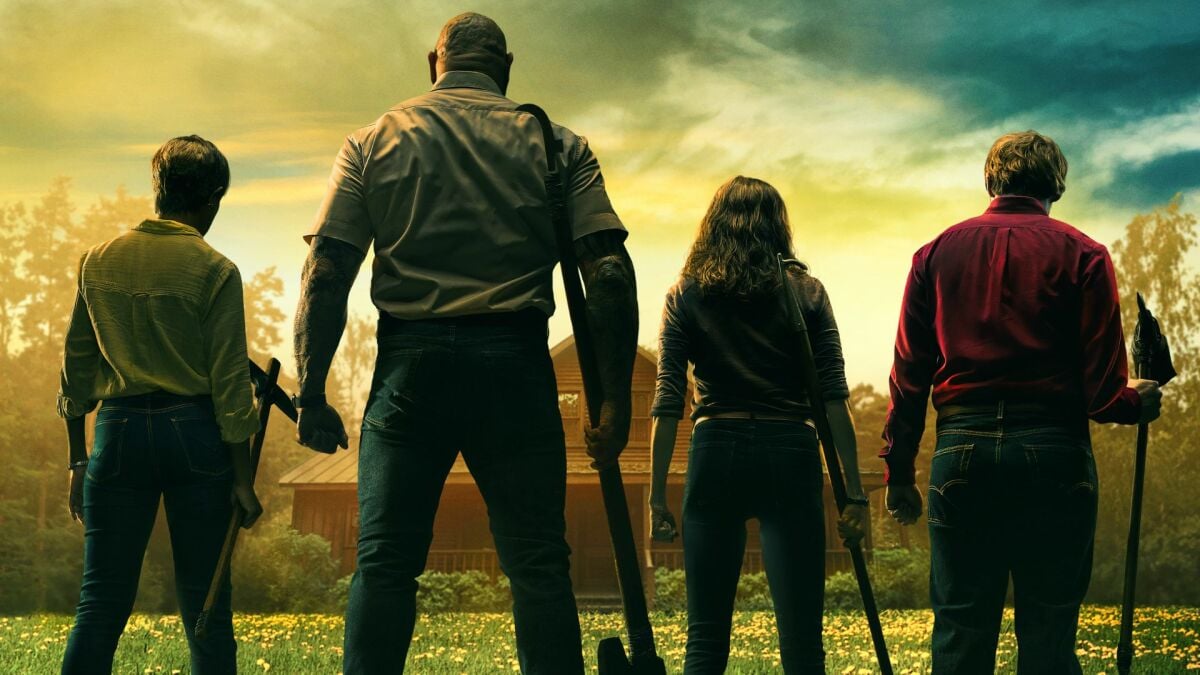M. Night Shyamalan forged his reputation on enthralling thrillers with mind-blowing twists, like The Sixth Sense, Signs, and Unbreakable. But over the last twenty years, a spotty filmography littered by abysmal offerings (Avatar: The Last Airbender, The Happening, Lady in the Water) has made seeing a Shyamalan movie a gamble in itself.
Sometimes he finds the fun in his self-sculpted niche, as he did with the deviously entertaining Devil and the gleefully goofy horror-comedy The Visit. Sometimes, he gets lost in florid indulgences of plot twists, overwrought emotions, and wringing out soggy, wobbly narratives, as in Glass and Old. His latest, Knock at the Cabin, falls more in the latter camp, regrettably enough. Though stippled with masterfully constructed suspense sequences, unnerving performances, and a compelling story, this thriller falls cataclysmically flat.
Be warned: Knock at the Cabin is not The Cabin at the End of the World.

Credit: Universal Pictures
Inspired by Paul Tremblay’s novel The Cabin at the End of the World, Knock at the Cabin centers on a terrifying home invasion that pits a family of three against four doomsday cultists. Seven-year-old Wen (an adorable Kristen Cui) is vacationing with her dads, Eric (a bright-eyed Jonathan Groff) and Andrew (a stern Ben Aldridge). But the peacefulness of their remote cabin getaway is shattered when a hulking stranger appears on the tree line.
This is Leonard (Dave Bautista), one of four self-proclaimed prophets who believes the end of the world is upon mankind. Joined by his cryptic colleagues Sabrina (Nikki Amuka-Bird), Adriane (Abby Quinn), and Redmond (Servant‘s Rupert Grint), Leonard invades the family’s cabin to put before them an impossible decision: To save humanity from Armageddon, one of these three must be willingly sacrificed by the other two. But first, the family must be convinced the apocalypse is nigh.
Those who read Tremblay’s book may think they know what will happen next, but the script by Shyamalan and co-writers Steve Desmond and Michael Sherman radically diverts from the source material around the halfway mark. Without spoiling the film’s twists, I can report that these massive changes not only impact the story’s conclusion but also its very message. And on this journey, your mileage may vary depending on how much of a believer you are.
Knock at the Cabin is not the thriller you’re expecting, for better or worse.

Credit: Universal Pictures
The premise might sound like something out of Stephen King, brutal and terrifying, but these home invaders aren’t exactly as they seem. Behind their clumsy uniform of dark denim jeans and button-down dress shirts, beyond their crude weapons, they have a tender side. They bind their victims, threaten them, then share personal stories, bandage the wounds they inflicted, and lovingly prepare meals. Their eyes tremble with tears as the ticking clock demands a human sacrifice. When so many horror home invaders are stoic or giddy, their despair in what they feel they must do is freshly chilling. To Shyamalan’s credit, the softness of these four horsemen doesn’t lessen the life-or-death stakes of the human sacrifice setup. They are regretful yet resolute, a distinction that urges the audiences to identify not only with the attacked family but also — do we dare? — the attackers.
The performances of this quivering quartet are thrilling. Though they are a group, each stands out. Amuka-Bird brings soft-eyed sincerity as a nurse pushed to the brink when demanded to hurt others. Grint growls with ferociously stooped shoulders as a blue-collar man with a chip on his shoulder and a dark past. Quinn is buoyantly flittering as a Gen-Z line cook as concerned with being politically correct as she is obsessed with her religious mission. It’s a collision of values that makes for some jolting funny moments, and Shyamalan smartly infuses humor and pathos into the story, giving the thriller a rich texture. But with his brawny frame and undeniable screen presence, Dave Bautista shoulders this group and the film itself in what might be the best performance in his career to date.
Dave Bautista stuns as Knock at the Cabin‘s Leonard.

Credit: Universal Pictures
From the first scene, where the towering Leonard strides toward the tiny Wen, there’s a threat implied by the sheer size and brawn of Bautista. His tattoos practically roar on his biceps and massive hands as he reaches out for the girl, but his movements are as gentle as his tone as he talks to the child about grasshoppers and doom. A dress shirt and a pair of wire-rim glasses illustrate how Leonard has tried to make himself look less intimidating, more approachable for his prey.
The awareness of his physical potential for violence is wrapped in the velour glove of a civil tone and a grade school teacher’s attire. While an actual gun comes into play, its involvement is less suspenseful than waiting for the inevitable moment when Leonard will lose his chill exterior and give way to the violence this premise and his body seem to promise. Ironically, this potential is more exciting when he is hidden from frame in a deceptively simple bathroom scene that’s a master class in building tension — a perfect example of Shyamalan’s skill as a director. Through it all, Leonard’s soft, ardent heart sets the tone of this film, begging the audience patiently but persistently to hear him out.
Knock at the Cabin fails short in its finale.

Credit: Universal Pictures
For maybe two-thirds of this movie, I was deeply invested. I was drawn in by this peculiar conundrum, where a family is caught between an impossible choice and an implacable gang of eschatological fanatics. The question of whether these harbingers are right or delusional not only sucks us into the plot, but also places the audience firmly into the camping boots of Andrew and Eric — bound to our chairs, helpless to do anything but listen and watch as horror unfolds. Shyamalan cleverly encourages our identification with the partners through a series of flashbacks, revealing them in happier, more relatable moments of love. However, as Shyamalan and his collaborators pull further away from Tremblay’s map, this journey lost me.
The use of news broadcasts as an expository device quickly becomes repetitive, not to mention increasingly detached from the reality of how news broadcasts work. This clumsy break from reality steadily erodes the grounded horror of this thriller. Characters begin to act in ways that feel less authentic and earned and more necessary for the plot to plod along. For instance, one person who runs away in terror returns minutes later, screaming — drawing exactly the kind of attention one might want to avoid when knowingly barreling into a conflict. The biggest character turn in Knock at the Cabin feels just as mystifyingly abrupt. The screenwriters try to paper over this with an overzealous monologue, which — even with the talent in this movie — feels flowery and forced.
Some will say that the book as it was could never have worked as a movie, because it was too grim. That might be true for a studio-produced tentpole with a famous director and star-studded cast. Our expectations for such a spectacle demand something rousing, even when dark. But I can’t help but imagine an indie drama that dared to tell Tremblay’s story without softening so much of it to cater to sentimentality and religious fervor.
In the end, Shyamalan leans hard into the influences from his Roman Catholic education(Opens in a new window). His changes to the source material favor a view of apocalypse, family, suffering, and self-sacrifice that — to this lapsed Catholic — were familiar. Yet these elements clashed with the world in the first act. Perhaps that was the point. Perhaps Shyamalan is knowingly shepherding his audience away from the world we know, which we insist is rational and within our control, and is trying to enlighten us to a vision that puts more faith in God and his potential for carnage.
Faith in a Catholic concept of God or faith in Shyamalan might be enough to see some viewers through this hard turn in the final act. For me, the finale is frustrating because so much of what came before was extraordinary. The performances of this ensemble root audiences into this claustrophobic catastrophe, while smart scripting offers no apparent escape. Cinematographers Jarin Blaschke and Lowell A. Meyer brew a foreboding atmosphere through Dutch angles that warn of a world going sideways. Violence kept largely offscreen adds to the eerie, tension-filled atmosphere, refusing audiences the catharsis offered by gasping at gore. Moreover, the abject beauty in the cinematography reminds us — even in the midst of violence — what wonders of the world might be at risk.
Undeniably, there’s technical brilliance within Shyamalan’s latest. But the final act divulges into earnest preaching that shrieks where the rest sings. Knock at the Cabin is ultimately 2/3 of a great movie but is fumbled by Shyamalan’s jarring conclusion. Ironically, rather than a change that would give mainstream audiences a happy ending, he has chosen one that is miserable in its own unique way.
Knock at the Cabin opens in theaters Feb. 2.
#Knock #Cabin #review #Night #Shyamalans #latest #believers






